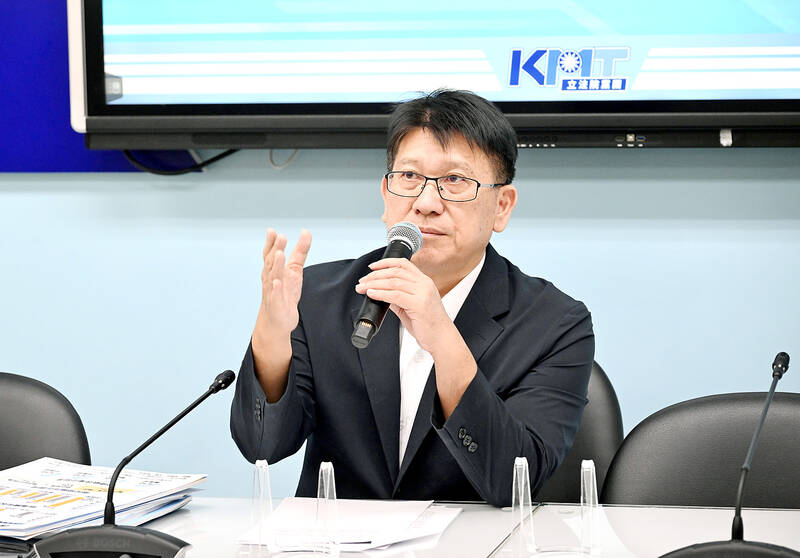Following an increase in publicity budgets, the Chinese Nationalist Party (KMT) caucus would review the Executive Yuan’s budget report meticulously, party caucus secretary-general Lin Szu-ming (林思銘) said yesterday.
The Executive Yuan’s budget for “media publicity for government policies and measures” for next year increased sharply by NT$590 million (US$18.5 million), or 65.4 percent, from NT$900 million to NT$1.49 billion, he said.
The publicity budget for the Ministry of the Interior increased the most by NT$240 million, while those for the Executive Yuan and the Ministry of Transportation and Communications rose to NT$60 million and NT$50 million respectively, he said.

Photo: Lo Pei-de, Taipei Times
The government might be squandering taxpayers’ money, he said, adding that the KMT caucus would cut unnecessary expenditures in the new legislative session.
The Democratic Progressive Party (DPP) administrations under former president Tsai Ing-wen (蔡英文) and President William Lai (賴清德) used the publicity budget to fill the pockets of certain media and excluded other bidders from procurements, Lin said.
The DPP engages in political propaganda through the media, sugarcoating its “poor administration,” while using “trolls” to attack opposition parties, he said, adding that Taiwan is becoming a “green party state,” referring to the DPP’s colors.
Lin also said the opposition parties would strengthen their cooperation in the legislature in the wake of Taiwan People’s Party (TPP) Chairman Ko Wen-je’s (柯文哲) alleged involvement in a scandal.
The KMT and TPP shared similar views on many bills during the previous legislative session, including budgets, laws and the evaluation of the executive branch’s personnel appointments, he said.
Ko’s case would not negatively affect the two parties’ cooperation in the new legislative session, he said.
Separately yesterday, Premier Cho Jung-tai (卓榮泰) said the Executive Yuan’s budgets are planned according to legal procedures and timelines.
Chou said he would not allow bidders’ exclusion in procurement processes and would give special attention if there is such a problem.
Additional reporting by Wu Hsin-tien

The disruption of 941 flights in and out of Taiwan due to China’s large-scale military exercises was no accident, but rather the result of a “quasi-blockade” used to simulate creating the air and sea routes needed for an amphibious landing, a military expert said. The disruptions occurred on Tuesday and lasted about 10 hours as China conducted live-fire drills in the Taiwan Strait. The Civil Aviation Administration (CAA) said the exercises affected 857 international flights and 84 domestic flights, affecting more than 100,000 travelers. Su Tzu-yun (蘇紫雲), a research fellow at the government-sponsored Institute for National Defense and Security Research, said the air

Taiwan is to commence mass production of the Tien Kung (天弓, “Sky Bow”) III, IV and V missiles by the second quarter of this year if the legislature approves the government’s NT$1.25 trillion (US$39.78 billion) special defense budget, an official said yesterday. Commenting on condition of anonymity, a defense official with knowledge of the matter said that the advanced systems are expected to provide crucial capabilities against ballistic and cruise missiles for the proposed “T-Dome,” an advanced, multi-layered air defense network. The Tien Kung III is an air defense missile with a maximum interception altitude of 35km. The Tien Kung IV and V

Trips for more than 100,000 international and domestic air travelers could be disrupted as China launches a military exercise around Taiwan today, Taiwan’s Civil Aviation Administration (CAA) said yesterday. The exercise could affect nearly 900 flights scheduled to enter the Taipei Flight Information Region (FIR) during the exercise window, it added. A notice issued by the Chinese Civil Aviation Administration showed there would be seven temporary zones around the Taiwan Strait which would be used for live-fire exercises, lasting from 8am to 6pm today. All aircraft are prohibited from entering during exercise, it says. Taipei FIR has 14 international air routes and

Taiwan lacks effective and cost-efficient armaments to intercept rockets, making the planned “T-Dome” interception system necessary, two experts said on Tuesday. The concerns were raised after China’s military fired two waves of rockets during live-fire drills around Taiwan on Tuesday, part of two-day exercises code-named “Justice Mission 2025.” The first wave involved 17 rockets launched at 9am from Pingtan in China’s Fujian Province, according to Lieutenant General Hsieh Jih-sheng (謝日升) of the Office of the Deputy Chief of the General Staff for Intelligence at the Ministry of National Defense. Those rockets landed 70 nautical miles (129.6km) northeast of Keelung without flying over Taiwan,